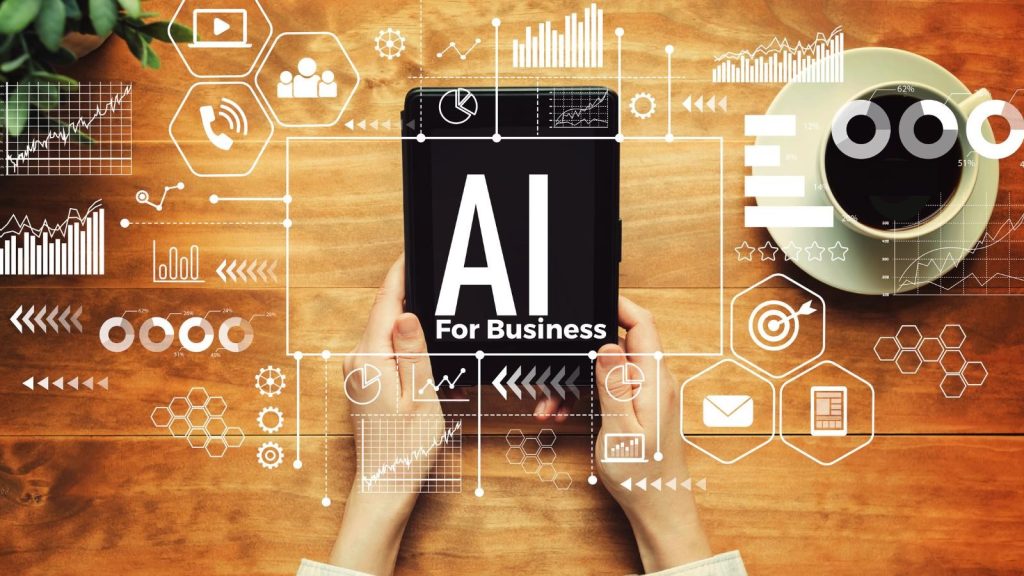 Artificial intelligence, or AI, offers powerful tools for modern businesses to improve efficiency and make better decisions. Understanding how to use AI for business can help you streamline operations, personalize customer experiences, and enhance decision-making. AI applications are wide-ranging, from automating routine tasks to analyzing complex datasets for valuable insights. By leveraging AI, you can gain a competitive edge and respond to market demands more effectively.
Artificial intelligence, or AI, offers powerful tools for modern businesses to improve efficiency and make better decisions. Understanding how to use AI for business can help you streamline operations, personalize customer experiences, and enhance decision-making. AI applications are wide-ranging, from automating routine tasks to analyzing complex datasets for valuable insights. By leveraging AI, you can gain a competitive edge and respond to market demands more effectively.
With a thoughtful approach, AI can transform areas like customer support, marketing, and data analysis. As you explore its capabilities, paying attention to ethics and compliance will also help you build trust with your customers. Below, you’ll learn the essentials of using AI responsibly to create value and support growth in your business.
Understanding the Basics of AI in Business
Artificial intelligence, or AI, refers to machines or software that can mimic human intelligence to perform specific tasks. In business, AI applications range from automating processes to analyzing vast amounts of data. Understanding how to use AI for business can provide you with practical tools to improve efficiency and decision-making. Many AI solutions can learn and adapt over time, making them valuable for handling repetitive or data-heavy tasks.
Several key AI technologies are useful in business contexts. Machine learning, for example, enables systems to learn from data and make predictions based on patterns. Natural language processing (NLP) is another important technology that allows AI to understand and respond to human language. This feature is often used in customer support chatbots and other tools that engage directly with customers. Deep learning, a subset of machine learning, goes a step further, enabling AI to analyze complex datasets, like images or voice inputs, with high accuracy.
Business owners should also be familiar with terms like “automation” and “predictive analytics.” Automation uses AI to complete routine tasks, freeing up human resources for strategic activities. Predictive analytics uses historical data to make informed guesses about future outcomes, which can be incredibly helpful in marketing, finance, and logistics. Learning how these technologies apply to your industry is essential if you want to effectively use AI to support your business goals.
Enhancing Customer Experience with AI
Using AI to enhance customer experience can transform how customers interact with your business. AI-driven chatbots, for instance, allow you to provide immediate responses to customer inquiries, improving response times and engagement. These chatbots can answer common questions, handle requests, and even troubleshoot simple issues without needing human intervention. This automation improves satisfaction by ensuring customers receive quick and accurate support.
Personalization is another area where AI can greatly impact customer experience. By analyzing customer preferences and behaviors, AI algorithms can tailor recommendations, emails, and product suggestions to individual users. Personalized experiences can make customers feel valued and understood, leading to higher engagement and loyalty. For instance, e-commerce sites use AI to recommend products based on browsing history, which keeps customers engaged and more likely to make a purchase.
Implementing AI in customer support also allows you to gather and analyze customer feedback, making it easier to identify areas for improvement. AI tools can categorize and prioritize customer feedback in real-time, allowing you to address issues promptly. By understanding how to use AI for business, you can create smoother, more responsive customer experiences that build trust and long-term loyalty. When AI is used to meet customer needs, it enhances satisfaction and strengthens your brand’s reputation.
Optimizing Operations and Efficiency with AI
AI can significantly boost operational efficiency by automating tasks and streamlining processes. In supply chain management, AI helps track inventory levels, predict demand, and optimize logistics routes. These applications reduce delivery times and prevent stock shortages, which improves customer satisfaction. AI also enables better forecasting, allowing you to make data-driven decisions and avoid costly overproduction or stockouts. Knowing how to use AI for business can enhance your supply chain and keep operations running smoothly.
Predictive maintenance is another area where AI is valuable. By analyzing data from machinery or equipment, AI systems can predict when maintenance is needed before a breakdown occurs. This approach minimizes downtime, reduces repair costs, and extends equipment life. For industries that rely on heavy machinery, like manufacturing and transportation, predictive maintenance can be a game-changer in terms of operational efficiency and cost savings.
Process automation with AI can transform repetitive tasks, allowing employees to focus on more strategic work. For example, AI can handle data entry, invoicing, and other time-consuming tasks that would otherwise require manual effort. Automating these processes saves time and reduces errors, leading to better productivity and lower operational costs. Through optimized operations, AI helps businesses become more agile and responsive, leading to a significant impact on efficiency and profitability.
Data-Driven Decision Making with AI
Using AI for data-driven decision-making enables you to analyze vast amounts of data quickly and uncover valuable insights. AI algorithms can detect patterns, trends, and correlations in data that might be missed through manual analysis. By understanding these insights, you gain a clearer view of market trends, customer behaviors, and operational efficiencies. This capability is essential for knowing how to use AI for business to make strategic choices based on solid data.
Predictive modeling is another powerful tool AI provides for decision-making. By analyzing historical data, AI can predict future outcomes with a level of accuracy that supports proactive planning. For example, predictive models can forecast sales, identify potential risks, and highlight areas for growth. This information helps you make informed decisions that anticipate trends, minimizing risks and maximizing opportunities.
AI also enhances the speed of decision-making, enabling you to act on insights quickly. Rather than waiting for lengthy reports, AI provides real-time data analysis, helping you respond to changes in your market or operations. This responsiveness is critical in today’s fast-paced business environment, where quick, informed decisions can set you apart from competitors. Embracing AI for data analysis and modeling supports a forward-looking approach, allowing your business to adapt and grow with confidence.
AI in Marketing and Sales Automation
AI plays a transformative role in marketing and sales automation by helping businesses personalize messaging, segment audiences, and streamline sales processes. Personalization through AI allows you to tailor marketing messages to individual customers based on their behavior, preferences, and purchase history. This targeted approach keeps customers engaged and more likely to respond positively to your campaigns. Understanding how to use AI for business in this way can elevate your marketing impact and boost customer loyalty.
Audience segmentation is another area where AI excels. AI can analyze data to group customers based on factors like demographics, behavior, and purchase patterns. With these insights, you can create tailored campaigns for each segment, improving engagement and conversion rates. Many brands have seen success using AI-driven segmentation, such as Spotify, which uses AI to recommend music and build playlists based on user preferences. This approach has increased user engagement by delivering a more personalized experience.
AI also streamlines sales tasks, freeing up time for your team to focus on high-value activities. AI can automate lead scoring, follow-up emails, and even customer service inquiries, helping maintain consistent communication with customers. For instance, companies like Coca-Cola use AI to analyze customer data and forecast demand, allowing them to align marketing and production more effectively. By automating these tasks, AI helps you maintain a seamless sales process, ultimately leading to higher conversion rates and customer satisfaction.
Ethics and Compliance in AI Usage for Business
Using AI in business requires careful attention to ethics, data privacy, and compliance. As AI becomes more integrated into operations, understanding ethical considerations is essential. AI systems often rely on vast amounts of personal data, so protecting this information is a priority. To build customer trust, you must handle data transparently, clearly explaining how it will be used. Knowing how to use AI for business responsibly helps maintain credibility and aligns your practices with customer expectations.
Data privacy regulations are also a critical factor in using AI. Laws like the GDPR in Europe and CCPA in California set strict standards for data collection and use. Compliance with these laws requires securing customer data, limiting its use, and ensuring that AI-driven decisions respect privacy rights. Regular audits and updates to data practices help you stay compliant with evolving regulations, reducing the risk of penalties.
Responsible AI use involves developing clear guidelines and maintaining transparency in AI decisions. This can mean informing customers when AI influences their experience, such as product recommendations or credit decisions. Keeping human oversight in place is another best practice, especially in areas like hiring or finance. A responsible approach to AI not only supports ethical business practices but also fosters trust and loyalty, ultimately strengthening your brand’s relationship with customers.
Conclusion
Learning how to use AI for business can unlock new opportunities, improve efficiency, and support data-driven decision-making. From enhancing customer experiences to streamlining operations, AI can make a significant impact on your company’s success. However, using AI responsibly requires attention to ethics, data privacy, and regulatory compliance. By following best practices and staying transparent, you can build trust with customers and create a positive reputation.
As AI technology evolves, adapting your strategies and exploring new applications will help you stay competitive. Embracing AI with a thoughtful and ethical approach can lead to sustained growth and innovation. With AI as a key tool, your business can better meet customer needs and navigate a rapidly changing market.


